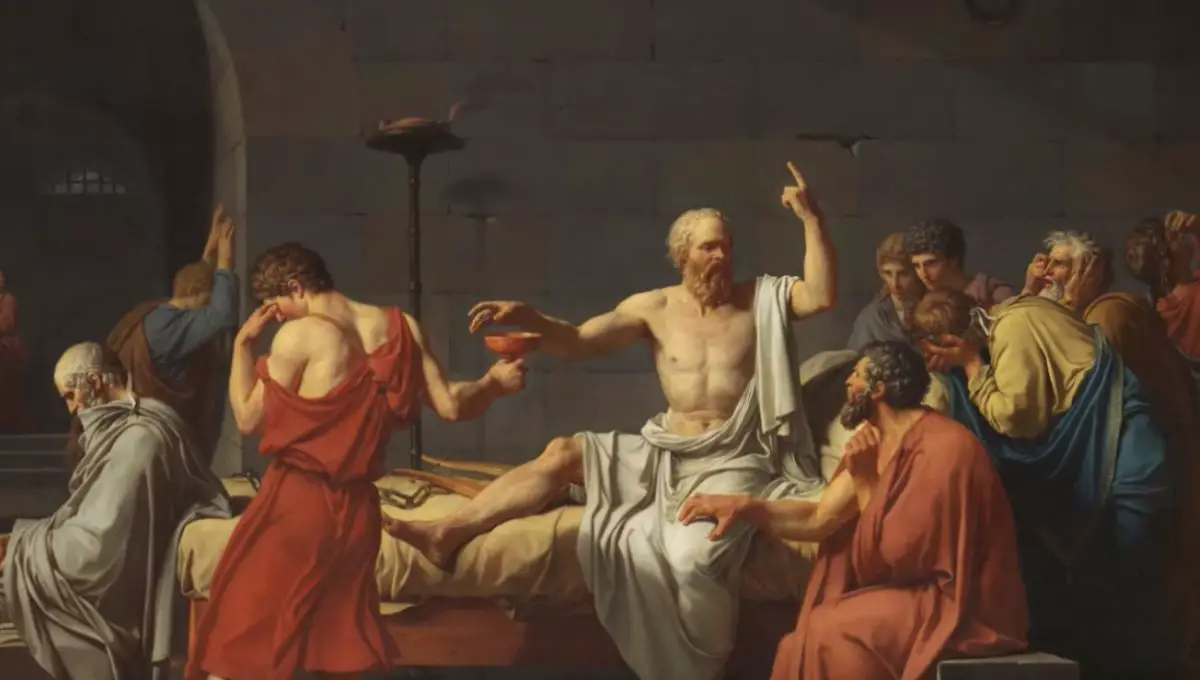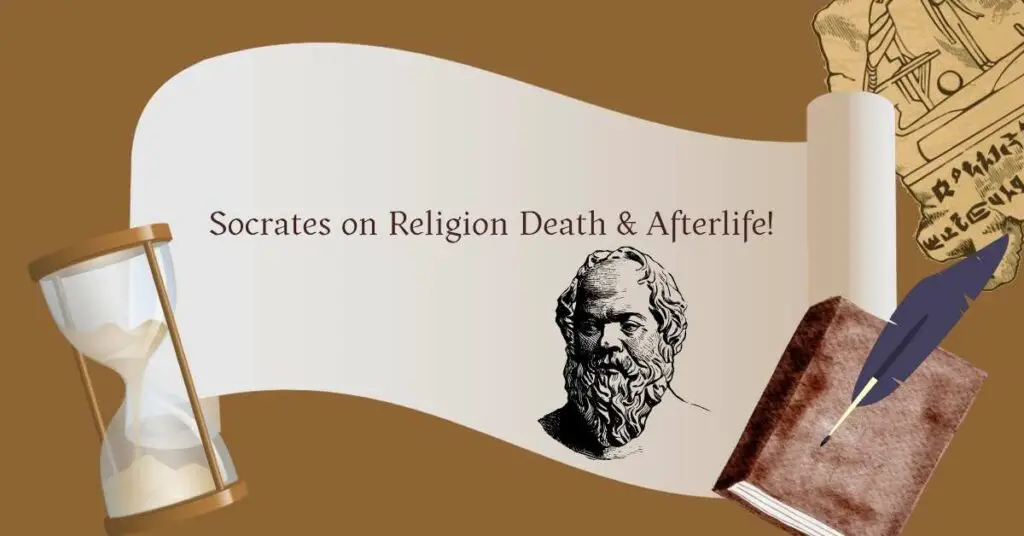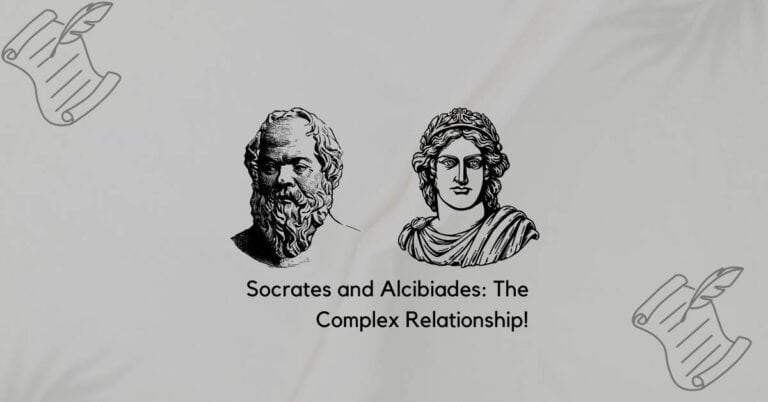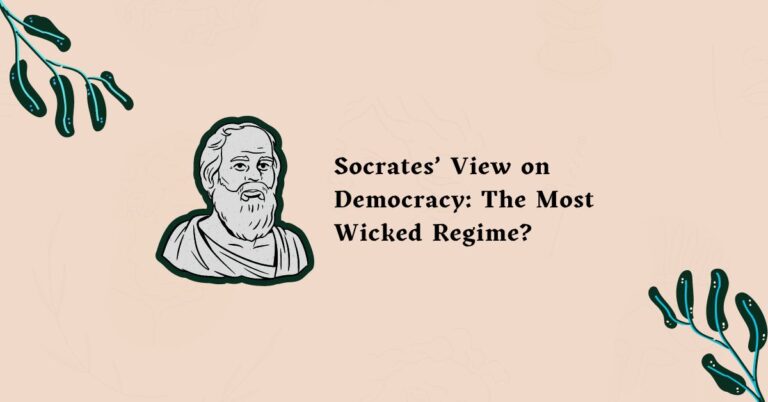Socrates on Religion, Death & Afterlife: Reason for his Death Sentence!
“An unexamined life is not worth living.” Socrates’ famous challenge goes beyond mere reflection; it invites us to scrutinize our deepest beliefs. This call to introspection is central to understanding his views on religion, death, and the afterlife.
Socrates, though not a prolific writer, left a lasting impact through his dialogues and philosophical inquiries. His probing questions and radical ideas often put him at odds with Athenian society, leading to his trial and execution.
In this blog post, we will delve into Socrates’ distinctive perspectives on religion, his fearless approach to death, and his intriguing ideas about the afterlife. We’ll also discuss how these views contributed to his trial and why they continue to spark debate today. Join us as we explore the profound and provocative aspects of Socratic philosophy.
1. Socrates’ Views on Religion
Historical Context
In ancient Athens, religion was not just a matter of personal belief but a vital component of public and political life. The city-state was a hub of religious activity, with citizens regularly participating in festivals, sacrifices, and rituals dedicated to gods like Zeus, Athena, and Apollo. Religious practices were deeply integrated into the social fabric, influencing everything from governance to daily routines. Temples were not just places of worship but also centers of community life, and the city’s well-being was often believed to depend on the favor of the gods.
Socrates’ Beliefs
Socrates, however, took a different approach to religion. Unlike many Athenians, he did not adhere strictly to the popular pantheon of gods. Instead, Socrates spoke of a personal divine force he referred to as his ‘daimonion.’ This divine inner voice, or spiritual guide, was said to provide Socrates with moral guidance rather than direct intervention in worldly matters. He believed this ‘daimonion’ influenced his decisions and warned him against wrongdoing, but it was not associated with the public worship practices of the time.
Socrates’ relationship with the divine was deeply personal and philosophical. He did not focus on traditional rituals or sacrificial offerings. Instead, he emphasized the importance of personal virtue and the inner moral compass that guided one’s actions. His approach was more about introspection and ethical behavior rather than the external forms of worship practiced by others.
Key Concepts – Daimonion and Piety
Daimonion: This term refers to the inner voice or divine presence that Socrates claimed to experience. Unlike the gods of public worship, the ‘daimonion’ did not demand rituals or sacrifices. It was more about personal moral guidance and insight.
Piety: For Socrates, piety was not merely about performing religious rituals correctly but about understanding and living according to a deeper moral truth. In his view, piety involved a sincere and thoughtful devotion, focusing on ethical conduct rather than superficial adherence to traditional practices.
Primary Sources
The dialogue “Euthyphro” is crucial for understanding Socrates’ views on religion. In this text, Socrates engages Euthyphro in a debate about the nature of piety. Socrates questions whether an action is pious because it is loved by the gods or if it is loved by the gods because it is inherently pious. This line of questioning reveals Socrates’ philosophical method of examining the essence of moral concepts rather than accepting them at face value.
Another important dialogue is “Apology,” where Socrates defends himself against accusations of impiety. Here, Socrates explains his belief in the ‘daimonion’ and argues that his moral questioning and pursuit of truth are not acts of impiety but expressions of his devotion to ethical living.
Controversy
Socrates’ religious views were controversial in a city where public piety was highly valued. His reluctance to conform to traditional religious practices and his emphasis on personal moral insight were seen as challenges to the established order. Many Athenians viewed his disregard for conventional gods and rituals as subversive and potentially dangerous. Socrates’ focus on his ‘daimonion’ and his critical questioning of accepted norms contributed to the perception that he was undermining the city’s religious and social stability. This tension played a significant role in the charges brought against him, ultimately leading to his trial and execution.
2. Socrates on Death

Philosophical Perspective
Socrates viewed death not as an end but as a transition or even a beginning. He saw it as a natural part of life and approached it with a calm, philosophical demeanor. To Socrates, death was either a peaceful sleep or a journey to another realm of existence, and neither was to be feared. He believed that fearing death was irrational because it was an unknown and uncontrollable factor. Instead, he emphasized living a virtuous life and focusing on the pursuit of wisdom.
Key Dialogues
“Apology”: In this dialogue, Socrates defends himself during his trial. He argues that death is either a state of nothingness or a transition to another life. He suggests that if death is a deep, dreamless sleep, it would be a welcome relief. On the other hand, if it is a journey to another realm where he can converse with deceased philosophers, it would be a profound opportunity for continued learning.
“Phaedo”: This dialogue takes place during Socrates’ final hours and focuses on the immortality of the soul. Socrates presents several arguments for the soul’s immortality, such as the Theory of Recollection and the Argument from Affinity. He discusses death as the separation of the soul from the body and contends that a true philosopher welcomes this separation as a release from the distractions of the physical world.
Death as a Philosopher’s Duty
For Socrates, facing death without fear was part of a philosopher’s duty. He believed that a philosopher should prepare for death by living a life of reflection and virtue. Death, in his view, was simply the ultimate test of his philosophical principles. By confronting death calmly and rationally, Socrates demonstrated his commitment to living according to his beliefs. He saw death as a natural progression rather than something to be dreaded or avoided.
Quotes and Interpretations
“Apology”: “For myself, I do not know whether it is better to live or to die, but it is certain that it is not right to flee from the appointed task.” Here, Socrates reflects his belief that it is more important to fulfill one’s philosophical mission than to evade the natural course of events. His stoic acceptance of his fate underscores his commitment to his principles.
“Phaedo”: “Death may be the greatest of all human blessings.” Socrates sees death as a potential opportunity for a more profound existence. This perspective challenges conventional views and highlights his belief in the soul’s continued journey beyond physical life. It suggests that death is not to be feared but embraced as a part of the eternal quest for knowledge.
Socrates’ approach to death, as reflected in these dialogues, reveals his deep philosophical commitment to understanding life’s ultimate truths. His calm acceptance and rational contemplation of death offer timeless insights into how we might face our own mortality.
3. Socrates and the Afterlife
The Immortality of the Soul
Socrates held a firm belief in the immortality of the soul. He argued that the soul is eternal and survives the death of the body. According to Socrates, the soul is not only separate from the body but also inherently immortal. This belief was foundational to his philosophical views and was central to his understanding of death and the afterlife.
Evidence from Dialogues
“Phaedo“: In this dialogue, Socrates provides several key arguments for the immortality of the soul. One major argument is the Theory of Recollection. Socrates suggests that learning is a form of recollecting knowledge that the soul already possessed before birth. This implies that the soul existed before entering the body and will continue to exist after death.
Another significant argument is the Argument from Affinity. Socrates contrasts the soul with the body: the body is mortal and subject to decay, while the soul is immutable and divine. He believes that since the soul is more akin to the eternal and unchanging Forms than to the perishable body, it must be immortal.
“Phaedo”: Socrates also discusses the Argument from the Nature of the Soul. He argues that the soul’s nature is to seek knowledge and truth, which aligns with its eternal essence. The soul’s pursuit of wisdom and its inclination towards the divine suggest that it is not bound by physical limitations and will continue its existence beyond death.
Concept of the Afterlife
Socrates envisioned the afterlife as a state of either continued learning or peaceful repose. According to him, the soul’s journey after death could lead to a realm where it meets other deceased souls and continues its quest for knowledge. In this view, death is not an end but a transition to a different mode of existence. This perspective is less about a specific heaven or hell and more about an ongoing pursuit of philosophical and spiritual fulfillment.
Socrates also described the afterlife as a place where souls are judged and receive rewards or punishments based on their earthly lives. This judgment is not a matter of divine retribution but a reflection of the soul’s own ethical choices and intellectual pursuits.
Philosophical Justifications
Socrates’ belief in the immortality of the soul and his vision of the afterlife are deeply rooted in his philosophical method and views on knowledge. His arguments are based on the premise that the soul, as the seat of reason and moral understanding, must be eternal to fulfill its nature. If the soul were not immortal, the pursuit of wisdom and virtue would be meaningless.
Socrates also used the Argument from the Harmony of the Soul. He compared the soul to a harmony that is created by the body. Just as harmony is a result of the structure of an instrument, the soul is a result of the body’s structure. If the body is destroyed, the harmony (soul) continues to exist in its own realm.
These philosophical justifications reflect Socrates’ broader commitment to understanding the nature of existence and the pursuit of a virtuous life. His views on the afterlife underscore his belief that the soul’s quest for truth and wisdom continues beyond physical death, offering a perspective that invites us to reflect on our own lives and beliefs about the eternal.
4. Socrates’ Death Sentence
Historical Context
Socrates’ trial occurred during a turbulent period in Athens. The city had recently experienced a series of political upheavals, including the fall of the democratic regime and the rise of oligarchic rule. The political climate was fraught with tension and uncertainty. In this environment, Socrates’ philosophical inquiries and his challenge to established norms were seen as threatening to the social and political order. The democratic government, struggling to stabilize and rebuild, viewed Socrates’ ideas as potentially destabilizing and subversive.
The Charges on Socrates
Socrates faced two main charges: impiety and corrupting the youth.
Impiety: Socrates was accused of not believing in the gods of the city and introducing new deities. His emphasis on a personal divine voice, the ‘daimonion,’ instead of the traditional gods, was seen as an affront to the established religious practices and beliefs of Athens.
Corrupting the Youth: Socrates was also charged with corrupting the youth of Athens by encouraging them to question traditional values and authority. His methods and ideas were believed to undermine the moral and social fabric of Athenian society, particularly influencing young men like Plato and Alcibiades.
The Trial of Socrates
The trial of Socrates is famously recorded in Plato’s “Apology.” The dialogue describes Socrates’ defense against the accusations. During the trial, Socrates maintains his innocence and argues that he has not intentionally harmed anyone or impiously disrespected the gods. He presents himself as a seeker of truth rather than a corrupter of morals.
Socrates’ defense is marked by his characteristic irony and logical reasoning. He argues that if he is found guilty, it would be a grave injustice because he has only sought to improve the souls of his fellow Athenians through his questioning and philosophical inquiry. His calm demeanor and refusal to pander to the jury’s emotions reflect his commitment to his principles, even in the face of death.
Socrates’ Defense
Socrates’ defense strategy involved several key points:
- Questioning the Accusations: He interrogated the basis of the charges, arguing that his accusers lacked credible evidence. For instance, he questioned the definition of piety and the supposed negative impact on the youth.
- Philosophical Mission: Socrates portrayed his philosophical activity as a public service rather than a harmful influence. He insisted that his pursuit of truth and virtue was meant to benefit the city and its people, not to corrupt them.
- Moral Integrity: He emphasized that his moral integrity and commitment to his principles were more important than the fear of death. Socrates asserted that he could not abandon his philosophical mission simply to avoid punishment.
The Verdict and Execution of Socrates
Socrates was found guilty by the jury and sentenced to death. According to “Apology,” Socrates accepted the verdict with composure. He used his final moments to reflect on the nature of death and the soul, showing no fear of the impending execution. Socrates proposed that his punishment could be replaced with a different penalty, such as paying a fine, but the jury chose death.
Socrates was executed by drinking a mixture containing poison hemlock. In his final moments, he continued to discuss philosophical ideas with his friends and followers, displaying his characteristic calm and rational demeanor. Socrates’ acceptance of his fate and his focus on his philosophical principles in his final moments have been interpreted as a testament to his unwavering commitment to his beliefs and his view of death as a natural part of the human experience.
5. Socrates’ Legacy on Religion, Death, and Afterlife
Philosophical Impact
Socrates’ views on religion, death, and the afterlife have had a profound and lasting influence on Western philosophy. His approach to questioning and critical thinking laid the groundwork for the development of classical and modern philosophical traditions.
- Critical Thinking: Socrates’ method of questioning, known as the Socratic Method, has become a cornerstone of philosophical inquiry. His emphasis on questioning assumptions and seeking deeper understanding continues to shape educational and philosophical practices.
- Ethics and Morality: Socrates’ focus on living a virtuous life and understanding the nature of piety influenced later ethical theories. Philosophers like Plato and Aristotle built upon Socratic ideas, exploring themes of virtue, morality, and the nature of the good life.
- The Immortality of the Soul: Socrates’ arguments for the immortality of the soul and his views on the afterlife influenced subsequent theological and philosophical debates. His ideas were pivotal in the development of Christian and other religious thought regarding the soul’s fate and the nature of the afterlife.
Modern Relevance
Socrates’ ideas continue to resonate in contemporary discussions on religion, death, and the afterlife.
- Religion: Socrates’ emphasis on personal spiritual inquiry rather than ritualistic conformity challenges us to think about religion in terms of personal meaning and moral integrity. In an age where many seek deeper spiritual understanding beyond traditional doctrines, Socrates’ approach remains relevant. His focus on personal virtue and inner moral guidance provides a framework for those navigating modern spiritual and ethical dilemmas.
- Death: Socrates’ view of death as a natural transition rather than something to be feared encourages a more reflective and less fearful attitude towards mortality. His philosophical stance on facing death with dignity and rationality continues to inspire those confronting their own or loved ones’ mortality, fostering a perspective that sees death as a part of life’s continuum.
- The Afterlife: Socrates’ vision of the afterlife as a realm for continued learning and moral reflection offers a compelling counter-narrative to more traditional or dogmatic views of the afterlife. In contemporary discussions about what happens after death, Socrates’ perspective invites us to consider the afterlife not merely as a place of reward or punishment but as an ongoing journey of the soul.
In summary, Socrates’ legacy on religion, death, and the afterlife endures through his profound impact on philosophical thought and his enduring relevance to contemporary existential questions. His challenge to examine life, confront death with reason, and seek deeper truths about existence continues to inspire and provoke thought across generations.
Conclusion
Socrates’ reflections on religion, death, and the afterlife offer timeless insights into the human condition. His unique approach to spirituality, his fearless acceptance of death, and his profound thoughts on the soul’s immortality have shaped philosophical discourse for centuries.
Socrates’ challenge to question established beliefs and his commitment to living a virtuous life resonate deeply in today’s world. His perspective encourages us to face our own existential questions with courage and rationality. By examining Socrates’ ideas, we gain valuable tools for understanding our own beliefs about life, death, and what lies beyond.
As we navigate our personal and philosophical journeys, Socrates’ legacy serves as a reminder to embrace the quest for knowledge, confront our fears with dignity, and seek a deeper understanding of our place in the cosmos. His thoughts continue to inspire us to live thoughtfully and authentically, making his philosophy as relevant now as it was in ancient Athens.



